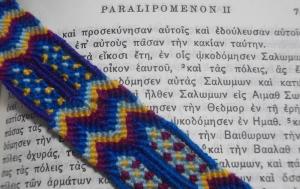The Greek version of the Old Testament, known as the Septuagint, is full of fascinating, surprising, often fun details, most of which you’ll never hear about unless you take the time to cruise through the text and find them for yourself. Not everyone is equipped to do so, of course, so I have attempted to package as many of those fun details as I can together here in one place. Even if you’re not a language geek like me, I invite you to skim through and glean what you can, and skip the parts that are too technical.

I am currently reading the entire Hebrew Bible in Hebrew, Greek, and Latin. (I have already done this twice for the Pentateuch, but only in Hebrew and Greek. I am skimming the Greek and Latin.) The longer I hang out with the translators who began the Greek Bible project in Egypt around 280 BCE, the better I get to know them and how they predictably handle the vocabulary and grammar of God’s word.
In the Pentateuch, the Septuagint (known by the symbol LXX) tends to follow the Hebrew Massoretic Text (MT) slavishly. One can account for almost every word, often in the same order as the Hebrew. When it mistranslates (“proselyte” instead of “sojourner,” “power” vs. “army,” “man man” vs. “every man”, or its consistently awkward translation of infinitive absolutes), it does so repeatedly. So when the LXX adds, skips, or changes anything, take note! So in Genesis 11, the LXX adds “and he died” for each character on the genealogy. Exodus 1:11 adds to the two store-cities that the Hebrews built “and Ōn, which is Heliopolis.” Genesis 46:28 adds “to meet him at Hērōōn, a city in the land of Ramessē.”
The LXX often switches “God” and “Lord,” which leads to confusion for source critics who base their theory on the use of these names to identify sources. It often uses different pronouns than the MT (you or I, versus he). In many cases, the Hebrew text it is translating will switch the Hebrew letters daleth and resh (Numbers 33:12 – Raphaka versus Dophkah); likewise, “They crossed the crossing” (2 Samuel 19:18) becomes “they labored a labor”, reading a daleth for a resh. Several times in Exodus 25-30 the Greek reads “I will be known” (nifal form of yd‘) instead of “I will meet by appointment” (nifal of y‘d). Such transposition of letters is common in the LXX, such as in 2 Samuel 7:19, where it reads “you have loved me” (’ahabtani) instead of “you have brought me” (habi’otani, transposing the letter aleph to the front of the verb).
The LXX calls Nimrod a gigas (“giant,” from Greek mythology), as it also calls the Anakim (Deuteronomy 1:18). It calls the Rephaim “Titans” (2 Samuel 5:18). It calls the sea monsters “whales” (Genesis 1:21). It calls discharges gonorruēs. It calls Canaan “Phoenicia” once (Exodus 16:35) and the Sidonians “Phoenicians” (Deuteronomy 3:9). It calls the Caphtorim “Cappadocians” (Deuteronomy 2:23). It translates the Sukkim of 2 Chronicles 12:3 (a tribe from the western Egyptian desert) as Troglodytai, a Sudanese tribe (literally “hole-dwellers”). In Isaiah 23:1, it translates “Wail, O ships of Carthage” for Tyre (see also 23:10). The Septuagint provides much evidence that the Hebrew letter ‘ayin is pronounced like a g: it spells “Gomorrah” for ‘Omorrah, gomor for ‘omer (Exodus 16:16), Raguel for Re‘uel, Haggai for Ha-‘Ai (Genesis 13), and Gaibal for ‘Ebal (Deuteronomy 11:29).
The order of verses and sections of material in the LXX varies wildly in Exodus 35–40. In the Septuagint, Deuteronomy 27:23 adds “Cursed be whomever lies with his wife’s sister.” The LXX adds details on Nahash the Ammonite in 1 Samuel 11, while it shortens the account of David and Goliath, it drops the reference to Eli’s sons sleeping with the women who served at the sanctuary in 1 Samuel 2:22, and it shortens Jeremiah by 1/8 and drastically reorders its contents. In Numbers 24:7, the Septuagint reads “Gog” for “Agag”, and adds “a man shall come from his seed and rule over many nations.” And in Esther 8:17, when the Persian king comes out in defense of the Jews, many of the pagans not only “Judaized” (same word as Paul uses in Galatians 2:14), but also “circumcised themselves” (not in the Hebrew text).
Out of 28 times that the term Amen occurs in the Hebrew Bible, the Septuagint translates it 23 times with the word genoito. It uses exstasis for the tardemah or “deep sleep” that God puts on Adam before creating Eve. In Genesis 21:22 and 21:32, the Septuagint calls Phicol the king’s nymphagogos or “leader of the bride”. It calls the lords (seranim) of the Philistines satrapes (a much later Persian term). In Numbers 11:20, Israel shall eat quail “until it becomes cholera for you.” The name Elisheba becomes “Elizabeth” in Exodus 6:23. And although erōs and its related verb eraō are found nowhere in the New Testament, the two are found a total of five times in the Septuagint, including Esther 2:17 (“The king loved Esther”), Proverbs 4:6 (“Love wisdom”), Proverbs 7:18 (“let’s delight ourselves with love”), and Proverbs 30:16, where the Greek mistakenly reads “the erōs of a woman” rather than “the barren womb.”
The LXX uses the optative mood (a verb form used for wishes and hypothetical statements) more than 500 times (versus 67 times for the New Testament); Job is particularly chock-full of optatives. The LXX often uses edomai instead of phagomai as the future of esthiō, “I eat.” In Exodus 32:26, it uses the rare form itō as a future imperative of erchomai, “I come” (also used in a variant reading in John 7:34).
While the LXX Pentateuch transliterates beer as sikēra, 1 Samuel translates it very literally as methusma (“that which makes drunk”). In Song of Solomon, it translates “love” (dodim) as “breasts,” and “female companion” (re‘ah) as plēsion (“neighbor”). In Isaiah 24:20, the Septuagint uses the Greek term for “hangover” (kraipalaō). It often uses tharsei (“take courage”) for ’al-tiyra (“Do not fear” – Exodus 20:20), and it sometimes uses eusebeia for the fear of the Lord (Isaiah 11:2). It translates drakōn for tannin in Exodus 7:9, “donkey-centaur” for “satyr” (Isaiah 34:14), “sirens” for “jackals” (Isaiah 34:13, 43:20), and “dung” on the ground becomes a “pattern” on the ground in Jeremiah 8:2. And three times (including Esther 2:3 and 2:9) it uses the word smēgma, although in the Septuagint it refers to a facial beauty treatment, as opposed to what the word means in English (Red Dwarf fans know what I’m talking about!).
The Septuagint has hundreds of Greek words that occur nowhere else in Greek literature. They are usually not Egyptian dialectical words, but simply compound words that are easy enough to understand, but that no other Greek writer ever uses.
One more fun surprise in the Septuagint: in the kosher food lists, we find two unexpected creatures: an insect called the “snake-fighter” (Leviticus 11:22), and the giraffe (Deuteronomy 14:5). Who knew these were kosher?? For more on these two fun details, I refer you to my “Kosher in the Greek?” article in ZAR 19 (2014): 307-12 (see link at http://www.biblicalethic.org).












